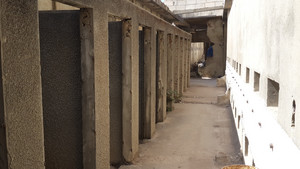Imprisonment in Contemporary Arabic Literature and Societies

“The prison as an institutional concept assumes a central position within countries across the Middle East and North Africa, exhibiting an often deliberately obscured, yet nonetheless pervasive presence within societies and their respective collective consciousness."
"Carceral systems throughout the region—before, during, and after colonialism—have proven intrinsically linked to, and partially determinative of, nations' trajectories vis-à-vis state-building, rule of law, and political pluralism. Yet the legacy of imprisonment is one that is currently still being written.“
(MENA PRISON FORUM)
*****
In view of the growing extent and importance of political imprisonment and state confinement in many countries of the MENA as well as other regions of the world, it is vital to look at subjectivities, selfhood and social spaces, political structures and institutions, as well as political culture at large through the lens of the prison. This not only means to investigate the state of prisons, the ways inmates are dealt with within and outside the prison space, and how people detained for various political reasons cope and deal with their situation during imprisonment and after release. It is equally crucial to understand more deeply how mass detention in countries like Egypt, Syria, and Iraq, to mention only a few, affects sociality, the family, gender dynamics, working environments, the relationship between classes, confessional groups and generations, and between the citizens of a society and the state in its longue durée.
The Workshop “State Force, Prison and Torture: The Afterlives of Political Imprisonment in the MENA”, held from 11-13 November, 2020, was the first in a series of events that engage with questions on the political function, nature and role as well as the pervasive impact of the prison space/s in modern and contemporary societies. How does the ‘prison regime’ shape the relation between a formerly incarcerated person and her/his environment? How does society look at the respective person after release, what is his or her social status? How do the social status and position in turn affect a person’s sense of selfhood, and world view? Do certain dynamics, habits and practices actually belonging to the space of the prison, have a second life outside prison, in ‘non-carceral’ social spaces? To avoid a false exceptionalism in regard to the Middle East, the comparison should not be limited to the countries of the MENA, but include countries like e.g. the UK, Brazil, India, Germany, or the USA, with the largest prison-industrial-complex since decades, and an extremely racialized and ‘classified’ space of the penal system.
On another political level, prison and torture are not only essential instruments of governance to secure and extend authority and political rule, but had and continue to have in many contexts the side effect of a radicalization of already extremist ideologies and militancy. This reality demands us to ask whether the paradigm of the “War on Terror” in combination with the prison-industrial-complex have not become the warrantors of a perpetual reproduction of authoritarianism that prevents any long-term democratic change, and fortifies ever more “the repressive character of the state”? (Khalili & Schwedler, 17)
Literary and cultural texts as spaces of relative freedom and deep reflection provide an essential source for gaining insights and knowledge about the histories, circumstances and ways of experience in regard to prison. Negotiating sociality and selfhood in specific narrative, visual and political-ideological ways, contemporary Arabic literature and cultural production in general are examined to create new and more precise insights into the complex field of the prison and related spaces and forms/areas of human action such as e.g. political resistance, new visions of a society and being human, as well as exile and states of mental and social fragmentation. This research endeavor is planned to be realized in close collaboration with colleagues from other areas of expertise, such as psychologists, anthropologists, and historians, and happens in close collaboration with the MENA PRISON FORUM Beirut (MPF): https://www.menaprisonforum.org/